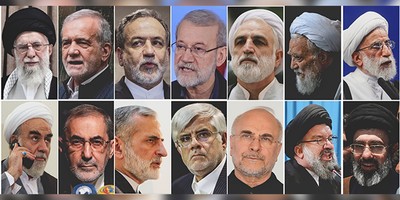"I was just a mouth piece for a liberal, leftist movement in the church," said Chelsen Vicari, author of the new book, Distortion: How the New Christian Left is Twisting the Gospel and Damaging the Faith.
During Vicari's time in college, she was heavily influenced by something she says is plaguing the Christian church: Liberal indoctrination of core Christian teachings such as the inerrancy of the Bible. The growing liberal evangelical influence in today's churches is something Vicari fell victim to, but through a series of mentors was brought to the realization she was deceived.
In "Distortion," Vacari goes through her experience with liberal Christianity and how the Church can come back to authentic Christian teaching with grace and love in a hostile world.
Townhall had the opportunity to ask Vicari a few questions about "Distortion" and its importance in today's Christian church.
- In your book, you write with such passion and a genuine concern for the future of Christianity and its core values. Why was this topic important to you and what is the main point you want people to learn about the "new Christian-left"?
Leftist versions of Christianity are targeting Evangelicals, especially on university campuses, youth groups, and the like. So it is my prayer that through Distortion, other parents, grandparents, and faithful Christians can expose the left’s deceptive tactics in the Church. If the breaks aren’t applied immediately to the Christian Left, then the next generation is on track to abandon the moral foundations and ethical principles that have made America great.This topic is so incredibly important to me because it’s partly my story. For a short time in college, I started to buy into this leftist Christian identity. Oh my parents will tell you that I grew callous and bitter towards what I thought was their “outdated” and “bigoted” version of Christianity. I specifically remember driving back from a family vacation and fighting with my mom and dad in the car because they refused to reconcile homosexuality with Christian teaching. After all, I was being taught at my campus ministry to affirm and “coexist,” not take seriously Scriptures that would hurt anyone’s feelings. Thankfully, my parents kept speaking about God’s truths in a loving tone to me and I backed away from this liberal political agenda cloaked in Christianity.
Recommended
2. How can Christians be sensitive to controversial issues such as homosexuality and abortion while remaining strong in their faith?
Just recently Christians heard the news that the United States Supreme Court has deemed same-sex marriage constitutional by not hearing lower court appeals in several states. Many Christians are feeling disappointed, maybe even disillusioned or willing to compromise Christian teaching on marriage. But no matter how disappointed with our government leaders, we should never react harshly. This is a reminder of why it’s vital to pray for our national leaders and also why character counts when it comes to voting.
On the other hand, it’s important to remember that the Supreme Court’s’ ruling is not God’s. As Christians, it’s our responsibility to take a confident and unashamed stance on not just marriage and abortion, but all of God’s commandments including to love our neighbors. However, it doesn’t mean that we are unwelcoming or unloving because we can’t accommodate homosexuality or abortion. We should love our neighbors enough to tell them the truth about what the Bible says.
3. Christians have been historically conservative Republicans. You argue this is changing. Why?
I’ve read it estimated that about 6.4 million Evangelicals voted for President Barack Obama during the 2012 presidential election. This was shocking to me, since the president had a heavy pro-abortion track record and shifted his support to same-sex marriage on the campaign trail. But these Evangelical votes likely goes back to the Christian Left’s increasing influence. If you are taught by leaders in the Church that morality and ethics are relative and priority should be placed on political correctness, then that makes it easy for one to consider themselves a follower of Christ and still vote for an anti-life, anti-marriage candidate without conviction. Don’t get me wrong. I’m not saying that voting Republican is Scriptural. Not at all! No matter what side of the political aisle a candidate is on, faithful Christians should consider how their moral character reflects Biblical values before placing a vote.
4. Because Christians are traditionally more conservative and small-government minded, why should they be on the forefront of pro-life and sanctity of marriage movements when that may seem in contraction to keeping government limited?
This question reminds me of the Apostle Peter who said, “we must obey God rather than men.” (Acts 5:29) For Christians, the importance of defending innocent unborn life and traditional marriage extends beyond conservative ideologies. If you say declare yourself a follower of Jesus Christ, then your responsibly is to His teachings. That includes defending the vulnerable and helpless or upholding sexuality in marriage between a man and woman. If Christians say that we don’t want to get involved in these two hot button issues because we are for small government, then we’ve got our priorities seriously out of order.
Chelsen Vicari is Evangelical Program Director at The Institute on Religion and Democracy and contributes to outlets such as The Blaze and The Christian Post.

























Join the conversation as a VIP Member